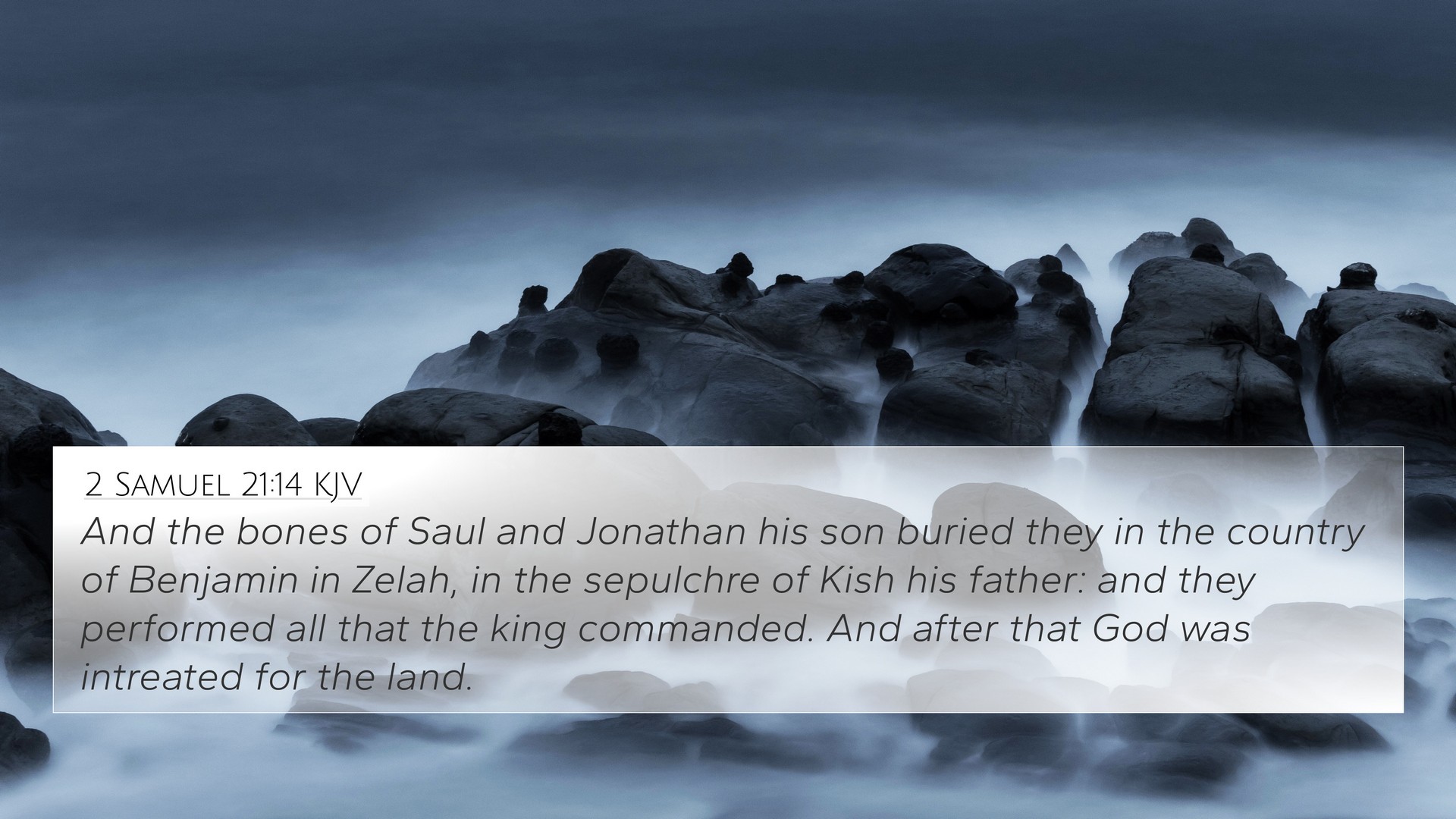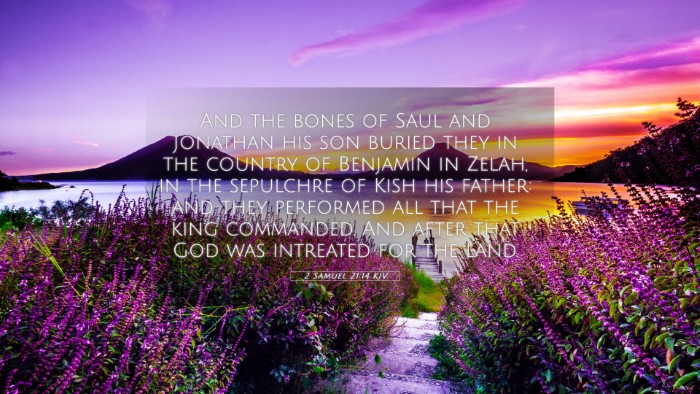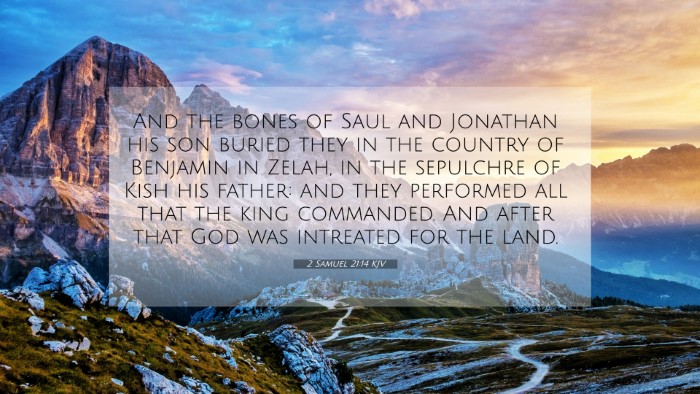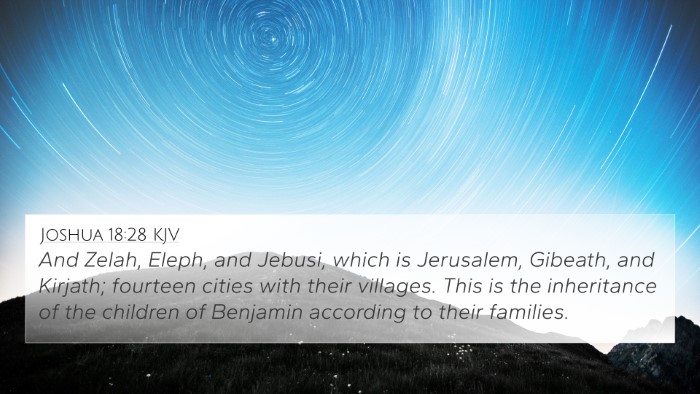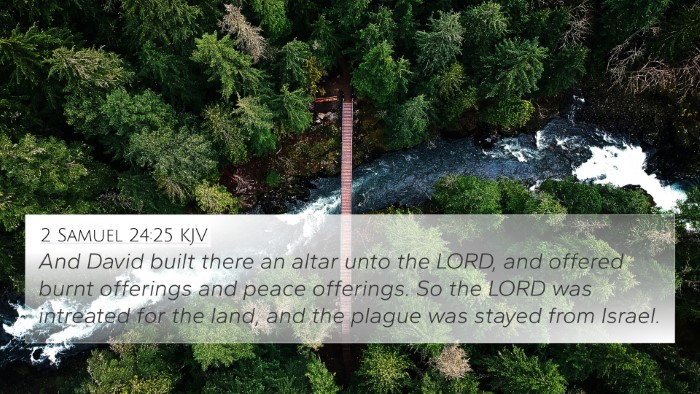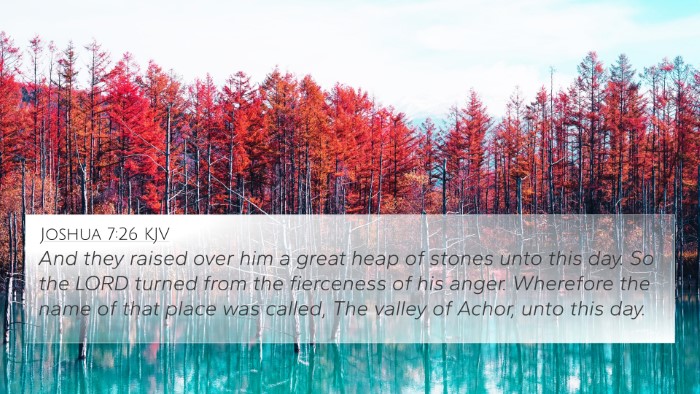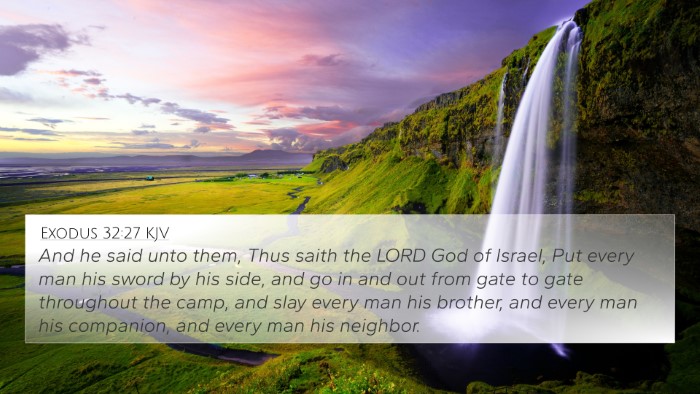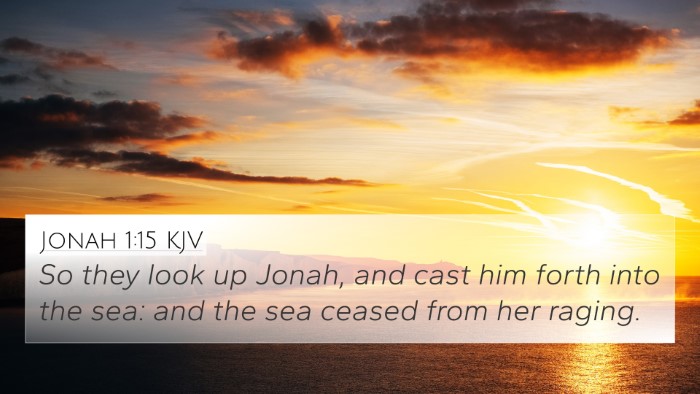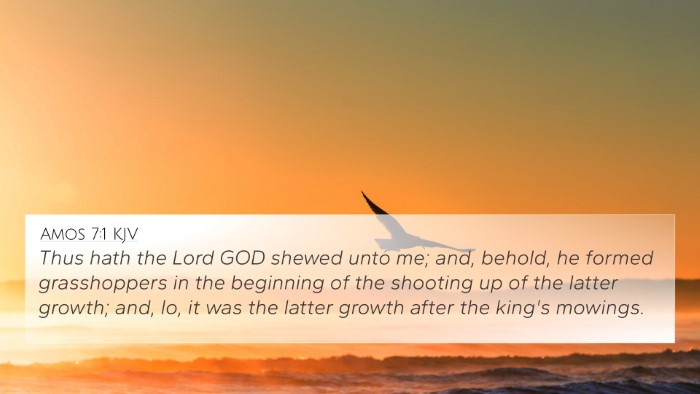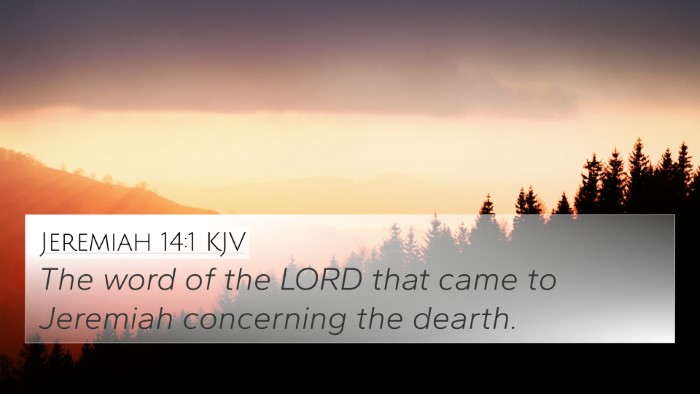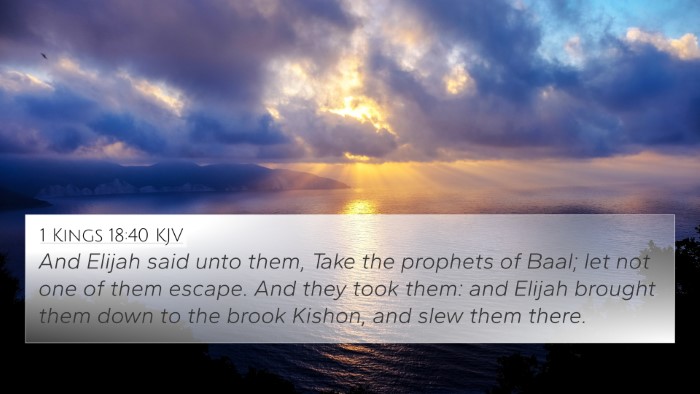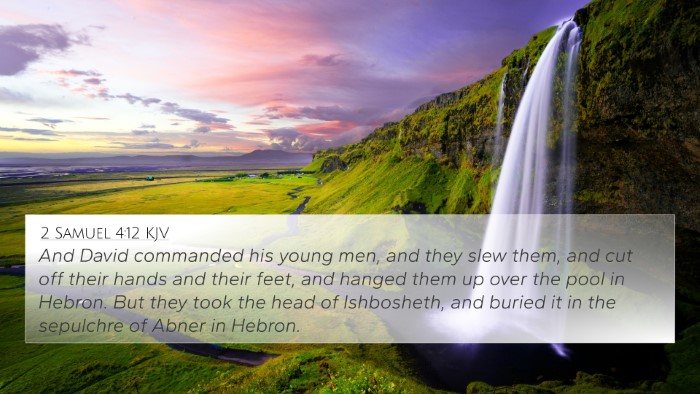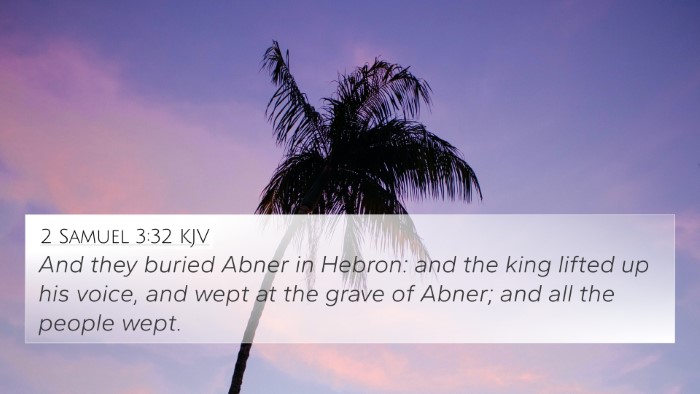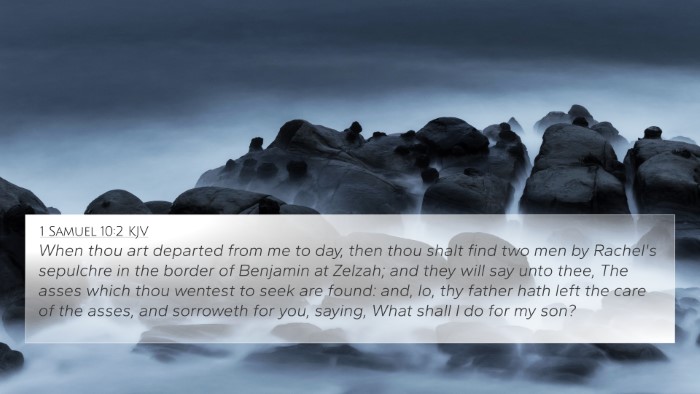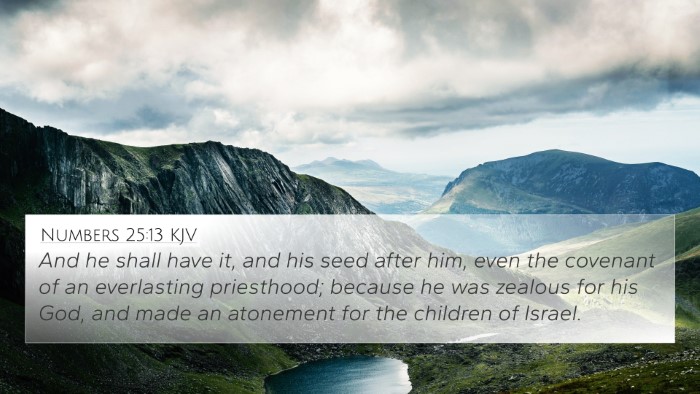Understanding 2 Samuel 21:14
This verse, 2 Samuel 21:14, states: "And they buried the bones of Saul and Jonathan his son in the country of Benjamin in Zela, in the grave of Kish his father. And they performed all that the king commanded. And after that God was entreated for the land." To grasp its full meaning, let’s explore the insights from public domain commentaries including those by Matthew Henry, Albert Barnes, and Adam Clarke.
Contextual Analysis
This passage reflects a moment of closure and reconciliation in David's reign, as he ensures the proper burial of King Saul and his son Jonathan. The actions taken signify respect for the dead and an acknowledgment of their past bond with David.
Key Themes
- Restoration: The proper burial signifies a restoration of honor to Saul and Jonathan, bringing peace to David’s conscience.
- Divine Favor: The conclusion of the verse indicates that God was entreated for the land, reflecting that proper actions can invoke God's favor.
- Collective Memory: This narrative underscores the importance of memory in the community's identity and history.
Commentary Insights
Matthew Henry
According to Matthew Henry, this verse emphasizes the importance of burial rites in Israelite culture. The act of burying Saul and Jonathan shows David's respect for their lives and acknowledges the troubled history between them. David acts with fidelity to restore the dignity that was marred by the warfare and animosity of past conflicts.
Albert Barnes
Albert Barnes comments on the significance of the burial. He asserts that David had every reason to ensure that the remains of Saul and Jonathan were treated with respect due to their historic legacies. Barnes also notes that the burial highlights the transition from a past filled with strife to a future under David's reign where peace and proper governance are prioritized.
Adam Clarke
Adam Clarke's commentary focuses on the geographical significance of Zela in Benjamin, indicating it as a fitting location for the remains of Saul, a Benjamite, and his son Jonathan. He explains that this act serves as a testament to the importance of kinship ties and the fidelity that accompanies them even after death.
Bible Cross-References
Several other verses resonate with the themes of 2 Samuel 21:14:
- 1 Samuel 31:13 - Describes the treatment of the bodies of Saul and his sons post-battle.
- 2 Samuel 1:11-12 - David's lament for Saul and Jonathan highlights the deep bond and loss felt by David.
- 1 Chronicles 10:12 - Similar to 1 Samuel, detailing the indignity faced by Saul and the efforts to bury him properly.
- Proverbs 10:7 - Reflects on the memory of the righteous, linking to the actions of David in honoring the dead.
- Jeremiah 22:19 - Speaks on the fate of those who do not honor the death of kings, indicating the cultural significance of burials.
- 2 Samuel 2:4 - Details David being anointed king over Judah, signifying a new era following the tumultuous times of Saul.
- Psalm 79:1-3 - A lamentation that resonates with the treatment of God’s people, paralleling the concerns raised in 2 Samuel.
- Genesis 50:26 - Joseph’s burial of Jacob emphasizes the importance of honoring one’s ancestors.
- Matthew 5:4 - Blessed are those who mourn; this ties into the mourning David experienced and the restoration of dignity to former leaders.
- Acts 13:36 - References David serving his generation, linking back to the need for dignified handling of past leaders.
Conclusion
In conclusion, 2 Samuel 21:14 serves as a crucial point of reflection on the themes of respect, memory, and divine favor. Through the proper burial rites, the text emphasizes the transition from past grievances to future blessings. This understanding can further enrich Bible studies through tools for Bible cross-referencing, allowing readers to explore the complexities of God’s relationship with His people and the underlying principles of honor and reconciliation.
Further Study Tools
- Bible Concordance: Useful for locating references and themes across the scriptures.
- Bible Cross-Reference Guide: A resource that helps identify links between various verses.
- Cross-Referencing Bible Study: Methods for examining interconnections for deeper understanding.
- Comprehensive Bible Cross-Reference Materials: Tools to assist in exploring similarities between verses.
Inter-Biblical Dialogue
This verse opens pathways for inter-Biblical dialogue, linking narratives across the Old and New Testaments, fostering understanding of themes that reflect God's ongoing relationship with humanity.
